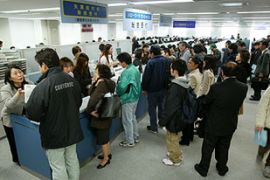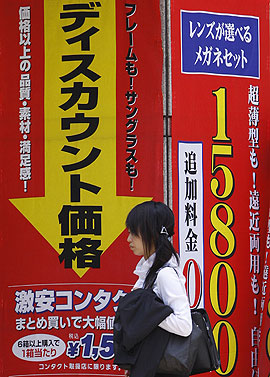Japan job losses add to PM’s woes
Soaring unemployment raises doubts about sustainable post-recession recovery.

Opinion polls says Aso and his ruling Liberal Democratic Party (LDP) are on course for a crushing defeat at the hands of voters angry at his handling of the economy and eager for change.
More than one million people have lost their jobs over the past year, lifting the unemployment total to 3.59 million, as companies slashed costs to cope with the worst recession in decades.
‘Worsening situation’
The total number of jobless in July jumped 40.2 per cent from a year earlier to 3.59 million. Those with employment fell 2.1 per cent to 62.7 million.
The labour ministry said on Friday that the ratio of job offers to job seekers in July fell to an all-time low of 0.42, meaning there were 42 jobs available for every 100 job seekers.
| In depth |
|
|
“There’s no doubt the job situation is worsening,” Takeo Kawamura, the chief cabinet secretary, said on Friday.
“The economy is still in a recovery phase. But we must pay close attention to the job situation.”
Japan’s economy recently emerged from a year-long recession with a return to growth in the second quarter.
But there are doubts whether it can sustain the recovery amid fears the economy could stumble again as the effects of the government’s massive stimulus packages fade.
Tough fight
Japan’s main opposition Democratic Party of Japan (DPJ), which has promised to put more money into households, looked unstoppable even before the latest economic data was released.
 |
| Deflation deepened after core consumer prices dropped at record speed [Reuters] |
According to latest opinion polls, the DPJ is set to win more than 300 seats in the 480-seat lower house of parliament in Sunday’s election, effectively ending the LDP’s almost unbroken 50-year reign.
Deflation also deepened last month with core consumer prices dropping 2.2 per cent in July from a year earlier – the fastest pace on record, according to Japan’s internal affairs and communications ministry.
The country’s key consumer price index, which excludes volatile fresh food prices, fell for a fifth straight month after a 1.7 per cent decline in June.
Lower prices may seem like a good thing but deflation can hamper growth by depressing company profits and causing consumers to postpone purchases, leading to production and wage cuts. It can also increase debt burdens.
Japan was stuck in a deflationary spiral for years after its asset price bubble burst in the early 1990s, prompting consumers to put off purchases in the hope of further price drops and reducing corporate earnings.
“The deteriorating job market may depress consumer sentiment and lead to a vicious circle” of weak growth leading to more layoffs, Naoko Ogata, senior economist at the Japan Research Institute, said.
“Domestic demand is pretty weak. We expect deflationary pressure to increase.”
